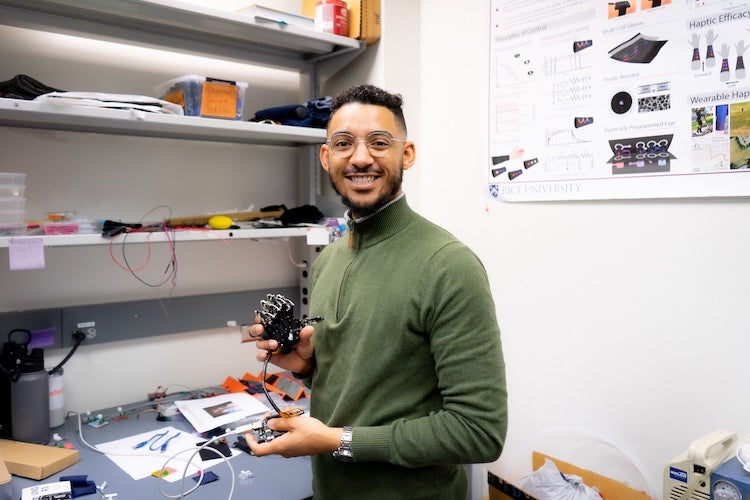Marquise Bell, a doctoral candidate in Rice University’s Department of Mechanical Engineering, has published an article in Science Robotics that underscores the critical need for fostering diverse and inclusive spaces within the robotics community. His piece emphasizes the value of representation in advancing the field while providing actionable insights on embedding intentionality into these efforts.
Bell calls for a shift in how diversity and inclusion are approached within STEM fields, particularly in robotics. Drawing from his personal experiences as a Black man and an advocate for equitable representation, Bell argues that intentionality — the deliberate and conscious effort toward a desired goal or standard — can lead to a stronger sense of belonging in addition to furthering innovation and advancements.
“Creating a sense of belonging isn’t just about numbers; it’s about fostering environments where everyone feels embraced and empowered to contribute,” Bell said. “Intentionality bridges that gap, ensuring that diversity is not an afterthought but a core element of how we move forward by embedding it into the very fabric of our daily lives.”

Bell’s article recounts pivotal moments in his academic journey, including the impact of having his first Black professor during his undergraduate years.
“Seeing and knowing someone like me who excelled in the field gave me the confidence to push forward,” Bell said.
He also reflects on encounters at international robotics conferences, where the lack of diversity was palpable, he said, and the significance of mentorship from those who shared similar lived experiences. These anecdotes highlight the challenges faced by underrepresented groups in STEM and underscore the importance of visibility, mentorship and intentional inclusion efforts.
Bell also cited research showing that diversity in thought, background and experiences not only fosters innovation but also improves outcomes in robotics, particularly when addressing issues like cultural biases in artificial intelligence. His article further critiques the “extra work” often placed on underrepresented individuals to advance diversity initiatives, advocating instead for systemic approaches that integrate these efforts into the culture of STEM fields.
“Intentionality isn’t just about representation; it’s also about removing obstacles that hinder progress,” Bell said. “When we cultivate a culture of care and respect, we unlock the potential for more equitable and impactful solutions in robotics and beyond.”
“Marquise’s work exemplifies the leadership and forward-thinking we aim to inspire,” said Bell’s graduate adviser Daniel Preston, assistant professor of mechanical engineering. “In addition to the meaningful technical advances of Marquise’s research, his insights and efforts to improve the culture of science in our field are critically important and will have a lasting impact.”
Bell’s research centers on advancing wearable robotics through the thermal and fluidic design of compliant materials, combining innovation and practicality. At Rice, he has held leadership roles within the Black Graduate Student Association and the Mechanical Engineering Graduate Student Association, fostering inclusivity and collaboration. He has also served as a graduate student ambassador and Pathways mentor at Rice, and he is actively serving as a mentor in the School of Engineering and Computing’s mentorship program, STEM Muse.
Recognized for his academic excellence, Bell earned a GEM Associate Fellowship from the GEM Consortium and a prestigious NASA Space Technology Graduate Research Opportunities Fellowship to develop advanced textile materials for spacesuits, aiming to reduce their weight and enhance functionality. Beyond academia, Bell is a passionate advocate for education and opportunity, co-founding a scholarship for minority men who graduated from his high school in Wichita Falls, Texas. As he continues his studies, he remains committed to modeling inclusive practices for future generations. Bell said his hope is that intentionality becomes a cornerstone of robotics and STEM fields, ensuring equitable spaces where every student can thrive.

